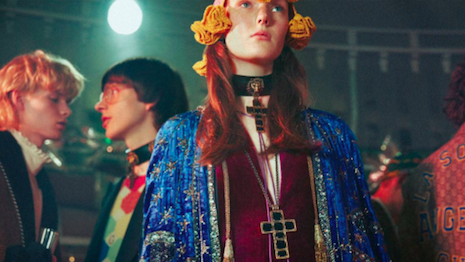According to new research, consumers tend to communicate more positive, passionate feelings about luxury brands on social media than they do about other retailers.
Luxury retailers dominated the top 10 in NetBase’s list of the retailers with the greatest net sentiment, with Burberry, Chanel, Gucci and Louis Vuitton among the highest ranked brands. In today’s consumer-centric retail environment, what shoppers are saying about a brand can have a significant impact on business, making listening to social conversations all the more important.
"The consumer is the new author of today’s brand story with shoppable Instagram stories, YouTube vloggers linking to their favorite products and Reddit users going deep into the attributes of what they love or hate about a brand or product," said Paige Leidig, chief marketing officer at NetBase, San Francisco. "Today’s consumer is only one tweet, Facebook post or insta story away from telling the world how their experience was with a retailer – positive, negative or neutral – and using their opinion to influence the purchasing decisions of others.
"This opinion-rich data represents a unique opportunity for brands to leverage customer experience insights in near real-time to capitalize on consumers wants, needs, desires and frustrations," he said. "These insights – a true crowd-sourced focus group at your fingertips – offer businesses unique opportunities for improvement, product innovation and the chance to engage, interact and learn from customers in ways they never had before."
NetBase’s report tracked 6 billion mentions of brands across seven categories: luxury, big box, department stores, athletic, ecommerce, clothing and grocery. The mentions studied over the year leading up to Oct. 1, 2018 were in English, but came from multiple countries.
Listening in
NetBase assigns brands scores that tell the ratio of positive or negative mentions. For instance, if all mentions were positive, a brand would achieve a net sentiment score of 100, whereas a company with only negative posts would receive negative 100.
On average, luxury brands have a net sentiment of 70, the greatest of any category studied by NetBase for its report. Consumers are also more passionate about these labels, with an average passion index score of 67 for luxury brands.
Amazon topped the rankings with the greatest number of mentions. However, the luxury brands that ranked high on the list had greater brand passion indexes, a measurement that combines both mention volume and brand love.
Gucci was the luxury brand with the greatest number of mentions, thanks partly to its appearance and affiliation with hip-hop and pop artists such as Kai Kim.

Gucci's gifting campaign for 2018. Image credit: Gucci
However, Louis Vuitton’s net sentiment and passion intensity were higher than Gucci’s. Louis Vuitton achieved mentions thanks to a traveling exhibit and its partnership with skate brand Supreme on a co-branded collection.
NetBase says that a large part of the positive feelings around luxury brands are driven by aspects such as their exclusivity and authenticity.
Nordstrom is the highest ranked department store on the list, coming in at 20.
Similarly to Gucci, Nordstrom saw the most mentions, but its net sentiment and passion intensity were eclipsed by those of department stores including Saks, Neiman Marcus and Bloomingdale’s.
Bloomingdale’s has the greatest net sentiment of retailers studied, as well as the highest passion intensity. Consumers shared their love for free shipping and in-store offerings such as a Nintendo-themed campaign.
Instagram post from Bloomingdale's
One thing that successful brands have in common are partnerships, which enable retailers to create new experiences for shoppers.
"Brands in the luxury category with high sentiment and passion intensity share common themes: exclusivity, authenticity and art," Mr. Leidig said. "Designer collaborations, inclusion of popular musical artists, art installations and pop-up shops color the social landscape intensifying an air of excitement, exclusivity and desire for their brands."
Audience action
While many question whether brands should comment on social or political issues, research shows that for Generation Z, social justice is the way to their hearts (see story).
Luxury brands have taken this up, frequently backing positions on topics such as gun control and LGBT rights.
However, for brands studied by NetBase, wading into politicized topics has the potential to create animosity.
Target, for instance, publicized its openness towards allowing transgender individuals to use the bathroom that reflects their gender identity, pushing back against a North Carolina law. This sparked social media protests with the hashtag #AnywhereButTarget.
By listening to consumers, brands can not only gain information about what makes them tick, but they can also use this data to drive business decisions.
Despite the potential of leveraging consumer insights to guide merchandising decisions, many retailers are failing to effectively incorporate shopper data into their planning stages.
According to a report from Boston Retail Partners, while retailers tend to use information from transactions, customer relationship management systems and forecasting to plan, it is less common for them to mine social media data or customer segmentation insights. There is also room for growth in incorporating real-time customer feedback into planning (see story).
"Other retailers will get insights into the key attributes that drive consumers including sales discounts, price, customer service and online," Mr. Leidig said. "Chanel performs well across the board, whereas some brands have clear room for improvement when it comes to customer service, trending negatively in these areas.
"Best Buy performs well for price and sales/discounts, but less so as it relates to customer service, and Esty performs well in all categories except price, trending slightly lower for that category," he said. "Target’s numbers are consistent across all categories, not extremely high but not negative either, showing room for improvement across all categories."
{"ct":"8JXsYMHM0Jj7H+2mk+LXZLQXrFc25kdGXiGrizPGIE4Y6gIYtfg73Gswh3oGU2Ri1yQfazmcqj2zp0c0Ir+tr8TzxULzZ8rkr4XTujNSUdrSReufyJWgj4N+MW4aCZ6doH0Pqxby70HsCztmsoJP2XHR4+5hDYQRr4i5YjzrXy2vMEP2\/nSEsmkCHdN\/+TGm2DSFMw0BFx3ueiAZUXCLcn\/KEvbDY\/qrWNta+HBdp4gmcKGngarXCk5Obj+qP247FpQ9TlW93\/nuXGRzD\/xEoRmOXYHQNFHi2NDydgKmJhU6p2ZSRJnFwMYokhlHkEuTV0xs8RW6LZ3BRkFprhxhFl6TJl\/e+XC0rgb3qZMd2zsZ9Xxh1Rpr7gcqBsbgVOB+\/jIDHh8U40lAy194HY+xv71xssguWIGgrL9++ikUDoR2oDtTZm39HiIW+Pb31DFZbHYHzqSrWBeqM8eD9P7GJtqqF\/aE9s6cRkyZ6kapwGfCkr8AOz+aw9oBitT2Zytzwp4jgxD\/4DhUK07DqMh+iMWL0ZeQCj807T0IjKHFd8GZFc7vBm\/4yS0jM57N3ju8H58XZslSJEQ0gbOFe5FiNczATb7h4tM+UqGR2e2BTRhaDiMzF9EPEINLDIXju8o7dlUwtUhf+4w+cyBnMyvpa0XcL0m3Ne+buX3AVD6c5Fh\/dxs\/wNecxaa0\/3kptvu6ooOaLje331ac82cEkFeRoChRBz+5IoGaafBnFPUPcepzqfyf\/P6pV2SNv8Mz9aTzcb9nHWjoDEbQj4L+YxGG62NJGVGHWW\/YdN7aB0T8s60HGAOnoblMi\/BrwZigedljatLomhGs8qdHypgFOFQ0y1O8oUvxhZ8BX6EgXQnScncFYEGqH7OmRnwWMISjw+arvYD4N6\/2gyyMjkKj\/xkaAwvXusrgSRtMiyYKU\/B4muKsb1PCEjmnhggeqadTrGmme9Dj4Up0KU4TiKwhctWC2q6WA5ZWSiXJudQuuiTwmfOiiJK1pNmryfl+LuGN6Qa22EA9k7d+KbyETMoUPv0ejrYAGKIrJ47SNmlV2XjRw2wPJKXw2WxXSIUxeP86Iys6YBmMv+Yx5KU6uaXCiSpxkekxDgWYM2HH8ob0Cfy3U1DUfbtNwv\/29fKriU5iGpaQoSkIzpvpBxRLlj+TMLGaqiGFOpFnTc5fY\/jXH5gduZGFERpCXXTNWqmfvnouD6STDkbRgtUG6tnlP1G7xxZaNlh56593VSnPnAHoeUY+mooOhD+17OcYlAu8DzWr2YQ\/CPHS7ZGnS4+MSwEb5cc2h3NGtS\/z9QVON08v2LJ+9JfviK\/9LuJMz9XcxzyYk\/EG+YN9WXkxPUEX4zEgt+loYjeqnJXCGsMFnnhp2KUAD8Yel2LET+bkNycYmAsJnBin+Ojasx6J6QEAwsQQVmtCOgRHangwOXl5Qb5bciMt+EvxybsNMlJ4\/oOM+\/T5qp8RqbSjAkay4LUSwMfMt4eFirv+\/QTqVdilPvE+F60hMfwEBZdKLlebJsyRaeTHhlXohqK5ClC2\/tfYmSqkVmm\/vrmdNx6V1eE9ud9dPCNfBzzKou1v9wm89ffwHKopQdzNSV1gcJbc6yF7VsSox48cmniw3gSp5gz\/BkwrJ4p2BGBrVBBNKnfUNTUpKau6NMpQIPhqz79dHdWutixkEENh+eDdhWAdPsSkK3SoIp1yvnuCiwQC\/lNOM+u4KXdCBbZtdcQV1hOVLuV+RBwLpQAnfrqCj6fcmtA84lmFfRTxpiyeg1kU5fuTdGsdoFs\/cIYv1\/UWNNORN\/PsaSd9o\/L6CijzPFfLITvCrOYPBM0jrK1jT3eX1gj\/6BZFeKxgi6m6G54pPvMCf5bHRqfrs3inQ+OaK\/ATvNTHL6aKdiHUttysEWSnfstHiql2bXYWBUvbZpiCWekFNnQOsk8cyLX88cbY8eOr5MpHpVI\/en7A8cA+EjO8pRxD+6Mfsw4pb1QJVG\/MLRoTfBfCa37aVMoNM6I6D3bqIktUXWjlCl6fQEBlaam2KR\/vqquqHFJgGwb6EH5ujXOIqqUmfFUA\/ZC9htf3vm55aHQlKl5XIv\/SJzwncZuNUHFvrhvXnHYtkd0vDvHJYA7LIArvF5O8FNA25qSRoWNkq+0r3+vBw+R982MIqHT2\/9cdJF7y4REGSvBktZOTpWEwoD\/y7gZTNjWrlK87Axs2LBTgfHPMQ9Y2h7JNlRx1swV0nUwVKaCX\/\/j8\/a1eqa3BsyfLDin\/fT\/1M+pL4Shsv2Ko0sJzl3wlE4dPH4RDmLtj\/I04umsDL7zeFjBn28N6960AP76YqKP+78yFnitnDRSCO6ZvB6KDWELsKgyW4UJPy7pnaCGAJm3r9eQbQ7z\/ZGOFJ25SOnjQ3VaMx9D\/taX7YiB\/htrMLcLOdIeYggaNB1Xh7DVeoxgkxlavIcoXD6mgLZiwThpoMBGQnZ5ZXWj9eSSJAZ6f6x1sD84nnfdO498y8i2g94d1hKB2acDZwC4RJEei9iEp8dogtSE11HGMVYHpPJAoyPorWCZgj4NQiu+ds9H1JJchH0EV374T8EfVN05PEwmSUU5AzpqRFRCtJvV1XkqQtRwHLT28zVcGK2ix7UB\/eOvtYEjcmks7N4IIsZSeDqvZhTUJmaA7qWjbwmJ51qm+sfkry3wMJ6FT9BECa+IscCrKUtquhEhBHD6W1Pr18QbmFLsoAEbBGw151LUjztmlwC\/7NGEAmSYHojj6fLgy+2SiGpub\/WhSVhdPuZRoJQfVaKbJzQhLTVof9i+\/3PWANay\/7QdW6sH1Gwb4py3WqY\/9vbUFlKoj2bP8IsJIthx05IZPaSKTJJNbblaoBt9XtsA4wl\/DPfm7PVKCCIiIMWRBuE203SozNoIEHtYD9qHfjF8wtLgDSzfmifE\/KEOMS6W1ObM7KkZrbp7T60jSXU1D5cvMgSqQmhM4wWl0m3SPYdNoapFAmfbFDVUB+X5cBgdp5j88vPcFQT4unkUbd0lBqUHbbq80CkdI5XC\/HJtnihwNdysXpkm+twUOwFEeNva\/3mAhC10Zl85bd0cKxXhhzqWQsf4xWE44WG\/ofbRDYRBkZi3QRVLMFdMZyvlDfWiKRTSLjdNM\/k2WPR9cvw0dJYpQV6u34tOdkhLUzv2OlG83gz07z3lPPss857HeG5xCvb1pQZ4JADDbbyTmuOwwA9N0PJ07vlOy0ltCa3mcwIDHiO7tmN\/thialEUiZQbWhLEuBB2lc4Qt9IEKezioCEL2RnE9Vn+MjkDhtRvEJKYTW+6kBbdHKq27OBu+3A5bFa\/c90JtXxBsAipwIVCPDiWRURyV1N7YmoUU+dPs4\/5JA4KW961srxicp8mVCUrhhFupA4pzAyHjeKz9op\/l+3zaxhJPJhLAVwjPvQoR6t00q9audPoM6p1QHAxAVp3vaNan4eZHzI7Xswo9e4Nx2F5fJXlr0Uk\/zrrQr1RvMNq0HV+PAafNXgX9\/UFrc3iXebR6vis4Tt4sNDT\/d92g0vGzqEM0xSnqIptoNXTKLCk0YgJZv8NH9nENR+peasCUSM9itexWtO3b72D8f162XJUG8739Xl2kByigmNrI3XbJMD1hB9t2DjnmoT29sJy0RK0kD+zoTWI7ASJH+WyJQuN4fGFTIbfswn0T3v4j31qdO0g9BXvhsgGOwqH4pSl1ft9RcgsFQvQZY1jx9ftlHadNL4jAQ7GzpMg2DiANPQ7+0ZW+RoVOc3Ut2Es6d2VH3VQNbMFnXC\/fEnuEGngOmdZ15ooQJuZpyTupwXOuIav9mzFOti7+ozpk8bGRKvyWKmitRQsi\/5GKiU0I84UBAxMs\/9Ui+JiL8YHpbXeK1ZkqPdlxaWxKz7\/v0TlZ2S\/fOUbwpAEdcw1X7+UlprZqo\/KicBObGSnK7sXjcLurtn9FIn15suE8P34ef+tXqFL212KTBg4sCtKeTZReJEF6R4JJFDWfPA0N2l316okCihIFsxhcHn1+E9oS5spCnMneb2\/CWye2XMXnNwNx4\/3FTfyT+qde\/OzucfJEpXBxyZoIgq1cLo+7\/B6JSa94BswmBUlgfY5K2OMoRuI2dvsBlBF0fZvbo4fJWvxNDFBF2YBJc7wQRRWHg1YwDZEIbdEamCzEA0hHC8WPMekd8BzUHJdScN0F1OBUO7AaWb7aijGrpOsaqwi8zfDKLkKctXCl1VIAYPysbioQHD4nt0Bpu5M18dl6pgAuBsTPxnkBk4hfy\/k2skfJRRARE964zy6Sl\/Q2hDf7LH17jWjyOhKnGW\/UhZbt0w6WDdZKXltnxeWUe33G8nWq++GGZuYJ2+7bYDsfM6jbP9xbo0Q12AUpGjiZIclqXUAJwRnTFSBjTivS\/QKz0wC2JeFk8VCiviWbHZjczsO3ji6texep6qflE808DZ9Subr6epmiHJ8rgaHqiWd+A9g0llnWEIk4kzv7yftkVsk157NRgLN3NxeZ2cC19BYV9PRppsAGn+5yIEpGZkK19kLOelKgxZWXdwl2tgteWRptso1twkYZDks6yA+NCuDKoOguG2Y\/qrtol8bl5bNwHnob1g2C8RkW5IOnRobqhaFMfvXGdjnvI54bnPxOpCRpW0DUUDBPXqlWvB2oJx\/vWbdvEQJ2j+vt02PkUfDiQZ2P0GhRIigmkL\/Y64ExsWV3nmPc0AkulMY0STOZgXGRy043OVaN07aU9xbORxWBBTy4jarN0UgDlQozrblvaH9WHLZERfcHyr7\/r8gUUZ1TcQKigNIJuW0lY5whOeCdR46mKSDx+mItl\/eaPfQKHwbv0D4TrVNUg9\/CM6wUrVxc4s\/jY0hqpQXx0hICwQ+sXzf1azAGmxB04oI81492ySoDELOvsw2e9D8oi1OIqz458+ybV3puaHLn2v1WD\/Cpri6zJOxcLqzT8XdGevGzPFtfOayMTdaQGFbO6Jl0GDndDXGwjtbSC6MkbLkDxZLagtk6U4U5NqGX71KA6nC9fu7qePxIfmWOIqYA0k7sYt6N+W\/4Ba0gDu3bK8xIST06WRunNIX\/pi93aEApR2SL9sK4+sy8vNG\/eGlqf6YVk8UOboos505koYwFui\/UVcdowiGJAS4\/SH2JALYJ5DUkxSHnxxvSmSgZzYOPFnOn4KuuSuo5mK2fUyTNCEUztqwnNL0xGUhn2JaX4Bo0XlENLwhH4e3l0zlwoA2EWj+taCy4xsSYH8vjyDTu8VDsFq6WnCkSWB6ZTyl6McsEYPrzQdR601FioMAi3w+g+VQHUPiWBx3th46Ugc7FZ9oBdsza6DwyguB5PGEVwxnnrjnnk\/KN2dKh\/Rx7O7AOwHtb7cL4gVBCEtHJVaWzwYFnjir0sfdbOjYlHaszjCgKrrQWG4o7izGjZQEOUgP712zyWHo\/8PdqoOcqqwcjiFA31hKxHor\/jbapsyilbrltu9QZjiPx8X6+EynCol+uoadThksg077NpAis9fwdXQiyoB4CV4FTz50olv3ucE6N1zty7Dsgxv8lsu8Q8qS8YtvHuhUdXM6BHh7i7HxP3vX69tnSTbVytgHVeka\/n99S29GuiEscE3j7kVCraHYgXzLIvWIsReqH1iZAXhr+QkVDwcLEWF+eMsB9L+WDztTneBki4xy44YeQNUVgVqQ4WSmq+btx368+m2ra7vjTo8yvaHU5oZriQVnB+e\/C5cGkDE7kv\/\/FXfnsMhpMp4oSu\/62C002+m53g9xUPq4fv++3CU7ObxDqPijVyLLeoNFcWvAO+rxHbgIIqYU18HpIEdLmHePo2sajbzqs7OIS0Dxi\/lU2iwnDZLL6bDRZ+9zt4XVG1j7V1NGr\/KXyNXnvjJu\/OdwwkZKn0NzVVXYPWmyrYg0\/vjvC\/dBIeTI1oLwEk+D713boTHboTWDwXNukUmXn0teHv90wloz9f0XG\/z34VqR58ywbbftxOCu3DqMgG\/qm6Ye2R66SUAKJ3aqDqhsvdxQHmKa9NZFL1TnfTuWZTDLuw4YRUg1ofLbYJq2v3IhH43d7VFCgtxfwtET\/Vpb8cuPnginhomrSYIWT\/W9CTTGXwtozdx6j5wZcS8EbT1b9hQiIvlEQsDMG0qHNfKQ\/f9Bl76WaGPOZUjeUtox85ZYuA2JQckhAR5VK\/CaYVqqDYsnUbmAKNVwUuGyw4qMYdZscjmOFKbzPV3SEBrKYAjk5dvNoN1SYF07Q4Tvx0cHgIzvyUgkYVgB6yEDGimoJA7LjWnzwYiey6iG3xpFr0fDaQto\/aAHOmXII\/XetFX6vTi\/0EYX6tXFiKstQFJyXnz73j2rwrn3OQBx4dNG5Ujy0xNGJjrU7QLHel+dqP2BzENnW8H+ETwZOs9nCdc\/lsilChLO4uhTAkq+hDLY5rLGcLTxaJEnKuTGVImTNxMHrVcMD4A+UxzRgWBdNwNI+gerquoaZPWJb4a\/dqeCou53EoNWNV7RubBtsvRoPuuCnLb1UexDJfP++ABFcQppd67Pr7ShuqQMbNY64LeDB9\/ciHPvM\/KS0ixvMn4TcRCjEwsnq1rymHS4gTnHBxgBxZtFlC\/zM3xk4z5ILPK8JYSDqbhG07OZghth1h8BAEQEKsnb2TBfyJFYfEvNz4FF1NfppNrDBvBbjrgXUdOSD10jWMp0yHP2a0ZsvhPUbOsdXCJq77HgvfRp48r3s5h29H65FzpECWQ21oyACVZeKfq0uBlvvjpE4YKnUn6EYi1qOX4YqoEUh8zxyx1IZJf6RZS9vcFT1a1JxQQd5usPDzLhP8rW\/OjGXOPdWcPYt7JeYP3PjQ9q+kyUe8XR8PJ6vMHHGeNnTCa7V\/WELgVmVwmZw4dbD42EedaHQb3cgaFgx6pOIWFAHUpzuL9ccomQVXSRh5KXWz1Mh9iU3x1\/Z3nQgrnBb5XBo\/PTqHTav\/cjhCYj0q6jdhQ0Mv968Ttmm5g5pm1g5Zc2IC6rY6x9ukopihpl6wdEvj9\/0pXe4FrKPguTNBkYDjkc7e\/5\/UzNhOoXdHpFbTEnEWfFWeCh1Zgixb6g1GTkdtDa5Bq0ITSmRuJOAK0e0ZkLKZYa02fAlp3mdZeUyW\/3Tn06\/cdPsonEzaWU\/5tOl2dFLviwumTccc0XskE5z7Xrn\/TdqQEPIWHzF\/Yyn28vfjU8Z6Zw0iA19KbshGGbd6paabwRksFyIRwWiMIAUpb4QDNUMsOhaMzcG0qiACAZBWh8L\/O+wyI+udEDMC5mlIapyn4Ty14+NkG9xhW7cxeTsgNpin2hHQ4X5Nr7bulR0X2jcXhTmqkQt9UF5rMXKWs+hXW0PRsz\/5TZLHXX83D62OqdfbIwb2hQ0FL7h8pArHrcOGSlRaPRvQ1AA0LM66M\/sdByZzRipFJLZIkam5le1LGrU01T\/oTZ5FbmRl+JrisQOaWShoJuWzRbGitBVjSkMg7+M6c2HsLiGH1e5V16kQjsbwGN2U1gB4VBkKW2h8LYlbRFeFEXWuoA19ZHOn2R+8OxVVbz4FeRE1U4QXS0FRy2zrcTTNFbaO4FQzYOTra3tnkAxG0VzQn7XULzNdgZuXe5ti7V18ex6yG\/oFqi5T5HCfXWyyJTj6WfpW5wWs4XRDtOR9M\/KpzkkWVlMHWqrylfVK2WQRzoahmmAPyHMGe66Ot+1NkBxOpQIXKbri\/wqGBf0FmP94F+svE\/wkTBG9KFTgwkTjnxvHxEioEBlyWouCD8WPbk6rz\/DWp9MBZnUnSzkcEcEfGGUO3VGIQp3Bj+NLeyiH0hJc8wH2FlEd5HG\/jnyR7y5KUm5PAflUQ722INoa45zgEfmbzmOLI7jbgP+m8yOjMrkSMhBqmcKzRsQmDvqcjGJ2GSaPOSHDahzaCpALSOhVa3kd9nOOtMldr98MTS\/3TlkWT2hVjIQFQ2\/ZCHsuFiM2AvIRKAyvOEpTU5iF03UUFcMSsa09F0CmaK838Cu2Uc2IcVHLnFTXEmD+7WCaZFrvmbMqQnQ0Hk+sBSwT\/9TXRIUSYuHJlSEaBJP3emaFhT7fgfflEUqzDd3XHqCTvhrsfsI3IDqfSHo4F0SC1bw4VLNqnoSN2pirYxqMaCd0yQTDudLW8MkFDfUqDvaSrFkgzH8sa6mlfRQbCorBzlXG\/u0JxkEkDQ\/yDecpVeWj7D1Df3v9SHdGsqto7H6nvNOD0koFIShT6xL2I24XVLw33I7RFyNlJSaJ8RHAiF3DfCAGcJCWj6OszkqIughLXerFE+zitkrraPIOp3ow1iQfPjrNffNoe3n0qwp+bh6TBNuP\/cAz1Qcui52l1Fmr3ABWpqR\/ky3fzpJAQ1eFxt\/XqC80rRhYy2NDU+ZspdDOX3UKCOEKbyoXwSkdSczC2H3lBaYcyVijtYar9Yl\/xIOCzP6eGeZIleZqrMu\/sRkz9NZftc7siTge3BEt7awJA\/qeIwLRw1pA7EbFD4JWZCK0AhXVFwkQSuR5GryPb6aNdYJrGAlsrpKLtHYBFzeNh\/7QBwrO5ttsYLhrO9wToYopeCYW0Cf0Jxo4DUcjEORWw3bkMpt3LckpMHWUqRIUESdpscruaTWKu5TojxTpSdz6Bkic7pxYW\/pciHQ4rJ1me+4e5ZJlLf1Ym1KMi+C4F1DPDtM7Ft5K12KIVRpB6M2l5q2xkLQQu\/yUa8fGeBPhpoGg4UM4c86uAzqwxCT1VReG+5UVoKIcq2mx\/vW6+ONvstMEyYxnV9QuvngElTzwT6Z0Ci7YqidyfIGBAbSThnCy\/ndF4nxJ9Ix6iiVzKtZZZItzMsfoqrhNxBBnsjsWdljDeYUFchxJYFUVXlALQNyCUUNh4JWFX2oZlZKjlIqRiYKgU5QiK5nSSKuRNPN3kNZ0NueSi1jGTpkydXGwPh3BE3SCMlLi9b90VeLg1etx9IZrbneR2aH5mxpWIwx2eWfwY4HKVaXBvOh0Qh\/n3pR3bhTTup8oyCY2c8OphZx9UK7UDnXos00XB+tJdVUxP+\/SEwZmQ3qlAfXdVwmXncMRD7BZ6fxqoKmuUXS2faf\/JBb1OgLVgPulxhcWMeBApWRncTXjIK+F5Bw8s4mfvlKZD6YkK4QjBkA4LUPg2fUVMdihAB91cVO9C9\/AbiafK0Q8IpGi6NmVt4RDeBHIzHrAAcBiKkStq3n1FDczZGGTsvmHzboyA5D7zv8WB0\/GnEn\/4YZzZPPWiAF1i4PLOwddL+6wT\/hpJ\/MN2hafqItzjY6Mq+MwTjb7Ye1qVfAik0rG5yzQEHTbsuU4wvhvaplYz+WyCUjFAWwpbFLVTuyjTwASYzG5ae+Jc4ckC2Mvn7OdE7HAfRMAPmEJQGdLrR5pBxA3T8046dJiyKYfRbkb0W8azPyfjxW9he\/g60ACGeyc94KP\/OaF1H5esu7w8kNzMDe43\/pyefMBaN2pIRe3s2wDJdgCfT73ySv8\/n3dzd1VY1ngwQsaUWryTIX0axpWq1mTqbGgTg0UbGerht3YEOKKMfELUuPrAr4p10FI0JwxgkCNGEWDXzuJoJlWWZIs1W7V7uqH8\/gjtVg8no2B9J8+fTd+hiCgRFor8CuVj\/0XPkFWzCfkhhhhUsxA+eacYGHWVD+TjrCWCksf36WUqnknDHljgP7\/dCeEhLu3jpYBePWCA1\/+9cHltaAcfmK3tRWkV8yWJa2RIyvcZdcZZXjfA2p2l9gumRkCvHE+OTkf+V\/d+XsrlXZp1jJ7RE151O\/DaYJO05FZnF53cYD9NwhoSeGjXrcmsCnoXAdvoPwQRyX7XmBxH18+8sO7l2xrDqY2pMAcorCPiPAUSuQRUKWXO6kKnLFW97nNCRVwv2ikWHRwqP\/jNf7wMwvKfL1Fuxz3sqp4kTHQzs+LHtth7YN8FQlLO0tduXdklZ5lKj7JdVdlTZAqEq8b96G0lDt26wTcdMv1uzu2CHcAv4Utvucw83zZRtdgYIzyfJbFQNj1sDX6dqJcLi1QPt6pycHbuyafkdx6RBbTafxxPbImH\/+U93su0yrgtnRGX6iz0aYF8NMtJkVWYMazHN5ubtnigNM2RRm7gQRC5LUt+CKssLRlCXuqQ97CoDxRAOZeDbJ\/WItnO5IJgS3SYe3rYVoXZZQQ+7PdMkSsVHQJ47DiAlW6ntqdIiB8ctHlMlUTjJmtS8NtUOl7kCVUNFMYpRihGRYZzte4sW4AYjvh6VbrMrR\/jZ85racmM39Ize4hDoiujLLp39nyu+Jp9G0HPDxz\/D4M0+IBcHmUOqftnh4gAimDmdrobmD9XWmKKr6hTs5LODysTUC9kFMBXVvR3Vh2s7PQyIDc8stQnPogR3wxnvNhgy1DqOmoPVEh60AeOdB40gzN\/4MPCdogmk5KWkyuuv3mGz\/J1X8Kl273uQgVlDl\/B7\/ViptUwAt1ZfT7DuztqyhGeZp1Iu9dTxmjCo+dUFhDp1BAyX8gBTEGEIUFK1UV9fYakI8oAckFR2u1pjCkulWA0YmBBpswSuyA915ETUj6MepPOGT50Me4cxJsj57Nzn7TaSyRyvlC\/0L7Xf8uQqLqMGClSxmlVn2vKkJO2pGQlxcZjtz8NpZ7k4tyaM\/jxieGlU5AhxW8C9EKg0Hj5uWHCewEkOqp3mbqfKEw3OP38j0efkyRpO3UgJ+OKz524YaAorVX3M+iT5fPlZV6Cwo7FZ3Xka4g8O0zlUNFgsZV5C5HxCTFrJ9rL1QrM94yNbXUNoQw+tF7Sdf8\/QG21d\/BkcHfjfZbIzNRe0\/lHexZqAumRlGsUgxgeHqOlXD0VLWJdIBN+muX34PkXQqAgkxQQ2UL11yZq3JnI+F+R7VR\/jMni4AIBcm8oEBIWqJimqeCCz3lShD4yyq6KggbiytqlC8kJajVTzNTer23XJCxw31u95lwCL0muyKv+CbSRV+uCY6Of\/sKjFXYpKlobkaCCU76F+3DYm1qhfSFzqcsLWTPpKSa9c6WaHCXiL6npFv+x9NWXUxfYM7hqCTsKYpCBGzegtpPubzdTtAewLRpGc74gHOAWYVmccfJfEE+WooLhwEMdI0NHp7KX\/OhBUjnLjbJaSkZmo0iARZEAyqvCiicD+dadP9tfRt8s0\/j0bB+rEaiWtkjIU8P8HtD3yHMhuXTpaxXtWoB+yr8NjSsTUPz2PU29Fr3PZZE3OqNSjNCBjRtEi6QvWmvLqfr79jhZY6oqkThvvjPoIVP40nbnwdsppvH5qJpwPedMQ0obyVcltuqF\/+Mivx6wDh1UNA+NSJjkCDQTN5qOc5Kqrw3ceMSiITPYiYrJfC7h6eVbCR+2MTYEO31gGw7uUvbLOPiQr7zXh+iQ6cGPAgeLuCKR+zPPD\/Oru7m\/FG7ayTNnJUMSgdVImFcanICLAzbpdgpGvCiPgwM+NU22Fnr5OdlVA+2fKFgXsTXfKcgT8KwJ\/fPipBnzxnIxhJKD9SGgTQIPTXGMKAAXtiOOR2gXhW1y1DNVTOfWaAW\/0fGEV9fE3rMFp3Y6lIYkiFoeXjKxy9T9zCSlmEv8+1lOVGc0EOtZYyU1YWc+OBmobv328VWlVuKfQsG7f+v7sM0p+KmyBKnTbabQnTLG9pZdTrmACiD0H45jlWfAwgPZdq3myU3SW7LR\/29z1D\/i\/MZGoJsP61Wz89TmGbIWmHdCOd3DyhH4evzKG3+B4V+1\/4fsu3ZeeZ\/4Bz\/QaCEKj1sN4nfiQ6BdV0BRS3yP1WwWpp+yRJT1eYSPnjMcYuXPGkBhLqN4nE2wZn270O50IvNnvr9nMdRGbct17gbIk7\/szNcS7cV\/O\/+JGM2laIG4AHPhMMENs8\/srxHwXJfOrTq0gHuTnVPbMLU+m8vlVx5ZpLbLeUEmTpOm71dXoBR+A9VsFKo7QgW3lfPGWV0PSRh4aEC1uCZXmu1fLuYDA2S9HVQM5ziipM\/SErn1oGCzhIoFXoNVwcjvJcCnkESyr6pDoH+UX5I\/x6i3ed0rc+2EMY\/RWYBEPobmF8lEJee0noKY6PTzF76yl4QG+ChTviWhxRyhc0Bh6YYMDWU8F7EE8xtbST7ZWnAiBaCbXfn6plJmb9qzWZ8hpNpCouzjB9iW65mYuSO1pQgRCYHoE9KBLIYiG\/1dzsPZu1HuPqV42dXEbTgOb0+ll+y5jeWTd88IxEc+Jt0B5+vdFZZb26NTfr0ziPAGzkr4PZJctewW3cKZseELL5Gmv3wY9wYjJ+Ub9cl8arDNmUHd9vzJg==","iv":"1eb2c20f0e4ccd57e011cfddfccc4524","s":"c24cbade5013c245"}

 Consumers show their love for Burberry on social media. Image credit: Burberry
Consumers show their love for Burberry on social media. Image credit: Burberry